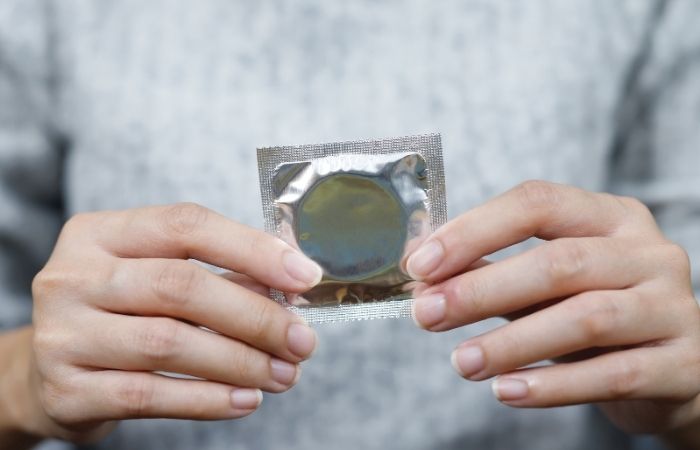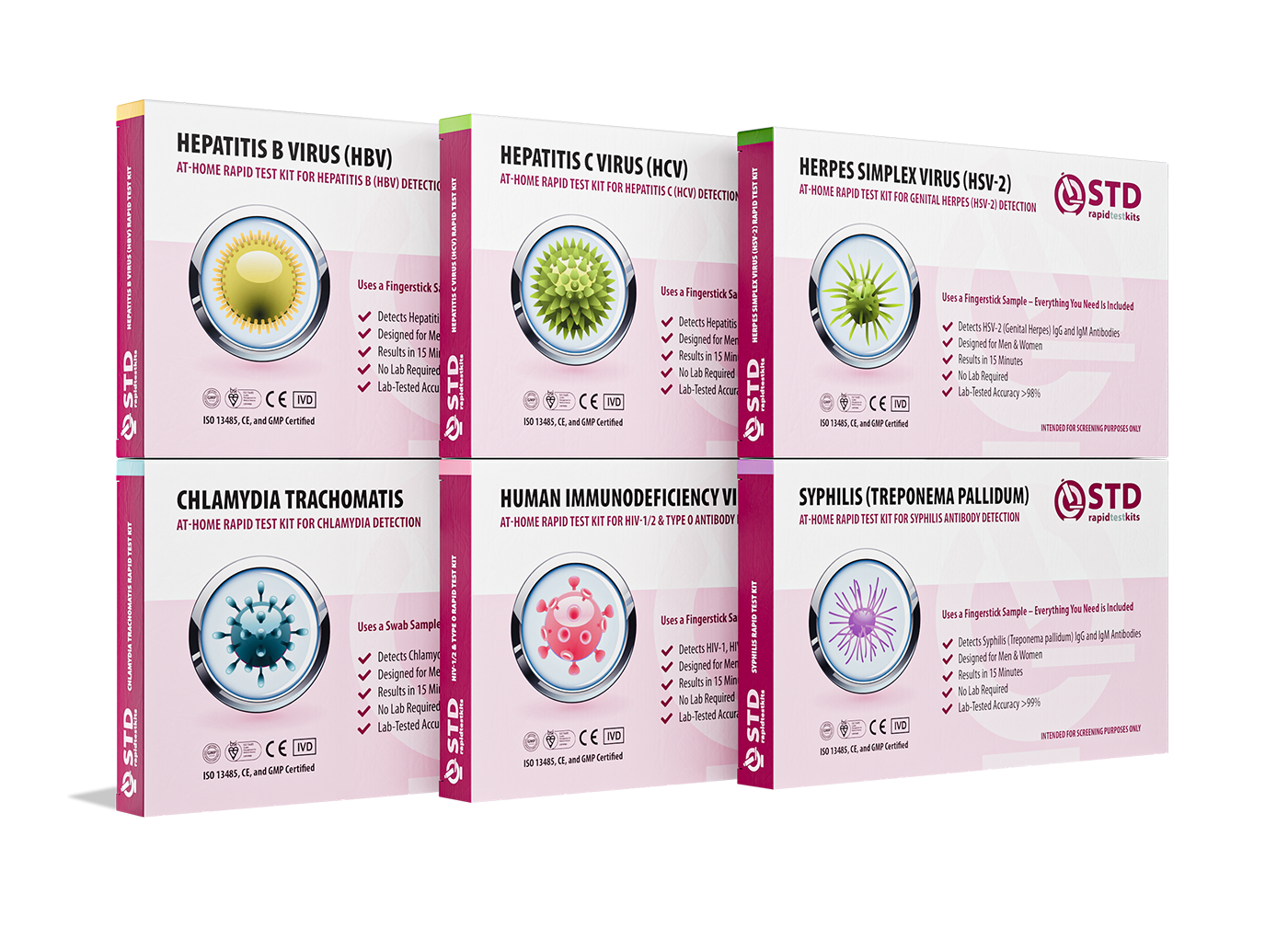Should You Test for Everything? Full STD Panel vs Single Tests Explained
Sexually Transmitted Diseases (STDs) with No Outward Symptoms
Some sexually transmitted diseases (STDs) might not manifest themselves right away. You can be infecting other people and not even realize it because many infections don't show any symptoms. Some of the most prevalent silent sexually transmitted diseases are examined below:
- Cervical Infection
The "silent infection," as chlamydia is often called, is among the most common sexually transmitted diseases (STDs) in the world. Most people with chlamydia, particularly women, don't have any symptoms at all, says the CDC. Pelvic inflammatory disease (PID) is a major contributor to infertility if left untreated. - Genital Herpes
Gonorrhea, like chlamydia, is often asymptomatic, especially in women. If symptoms do manifest, they could be minor or easily confused with something else, such a urinary tract infection. - Papillomavirus Infectious Agents
Many strains of human papillomavirus (HPV) do not cause any symptoms at all, making it the most common STD. While some varieties are known to cause warts, others subtly raise the danger of developing cervical, throat, and other malignancies. - The Virus That Causes Herpes Simplex
A large number of genital herpes patients either never have an outbreak or misdiagnose the condition when their symptoms are minor. Though they may not show any outward signs of infection, they can still spread the virus to others. - HIV
HIV can infect a person's immune system and weaken it while they are asymptomatic for years. In order to stop the spread of HIV/AIDS, early detection is essential.
Individuals who engage in sexual activity with more than one partner or who are unaware of their partner's status should undergo testing on a regular basis to protect themselves against these silent infections.

Important Reasons to Get Tested for STDs Often
Effective identification and management of asymptomatic STDs is best achieved through proactive testing. The main advantages of routine STD testing are as follows:
- Quick Identification Prevents Consequences for the Future:
Infertility is a possible outcome of untreated chlamydia and gonorrhea. Complications can be reduced with early detection and rapid treatment. - Stopping the Spread:
You can safeguard your partners and stop the transmission of sexually transmitted diseases by knowing your status. Infectious diseases that cause no outward signs of illness can spread rapidly. - Relaxation:
Having your status tested removes the guesswork and allows you to make educated choices regarding your health and relationships. - Effortless Home Testing:
Testing is now more accessible and private with at-home STD test kits. You may take charge of your sexual health without making an appointment at the clinic thanks to these kits, which can detect a range of illnesses.
Obstacles Posed by Asymptomatic STDs
There are a number of obstacles that could make discovery and treatment more challenging, even though routine testing is the best way to manage asymptomatic STDs:
- Missing Information
Most people don't know that some sexually transmitted diseases don't always cause any noticeable symptoms, so they don't get tested often. In order to close this information gap, educational programs are crucial. - Disparity in Testing
Individuals frequently refrain from seeking assistance due to societal stigma. The advent of discreet at-home test kits has changed the game in this regard. - Testing Opportunities
It can be difficult to conduct frequent STD screenings in areas with limited access to healthcare. One solution to this problem is the widespread availability of inexpensive at-home tests. - A Misguided Feeling of Safety
Misconception number one: being symptom-free automatically means you're free of sexually transmitted diseases. This mentality can be countered by promoting proactive testing.
Order Now $129.00 $343.00 Check Your STD Status in Minutes
Test at Home with Remedium
7-in-1 STD Test Kit




For all 7 tests
Evidence from Statistics on Asymptomatic STDs
It is crucial to test for sexually transmitted diseases proactively due to the high frequency of asymptomatic STDs. To further understand the situation, consider the following numbers:
- Chlamydia: Despite being the most often reported bacterial sexually transmitted disease (STD) in the United States, chlamydia has no symptoms in more than 70% of women and 50% of men.
- Gonorrhea: There may be no outward signs of gonorrhea in as many as 80% of infected women and 10% to 20% of infected men.
- HPV: Nearly 80 million Americans have the HPV infection, and many more don't know it because the virus doesn't cause any symptoms.
- HIV: The importance of routine screenings is highlighted by the fact that approximately one out of eight persons living with HIV in the United States are unaware that they are infected.
These numbers show that even infections that don't cause any symptoms can add to the current STD epidemic.
Techniques for Treating Sexually Transmitted Diseases in People Who Do Not Experience Any Outward Symptoms
It will take education, ease of access, and concrete measures to overcome the difficulties of asymptomatic STDs. For your consideration, here are a few suggestions:
- Advocate for Consistent Testing
It is extremely important to schedule regular STD examinations, particularly if you have sexual relations with new or multiple partners. It is simple to maintain good health with the help of at-home STD test kits and clinics. - Know Your Options Regarding Asymptomatic Infections
It should be emphasized in public health campaigns and school-based sex education programs that STDs can sometimes not cause any symptoms at all. By debunking misconceptions, we can inspire more conscientious actions. - Embrace the Convenience of Testing at Home
Because they are easy to use, quick, and covert, at-home STD test kits are changing the game when it comes to sexual health. When looking for asymptomatic illnesses, they are very helpful. - Prompt Honest Talking
Encourage partners to regularly discuss their sexual health. Reducing stigma and promoting mutual responsibility, conversations about testing and protection are important. - Always Wear Protection
Condoms and other barrier techniques are still the best way to avoid contracting sexually transmitted diseases. This, in addition to routine testing, adds another safeguard.

Knowledgeable Views and Practical Illustrations
It will take a multipronged effort, say experts, to stop the quiet spread of sexually transmitted diseases. "The asymptomatic nature of many STDs makes routine testing non-negotiable," stresses infectious disease specialist Dr. Emily Jackson. It is possible to save lives and avoid permanent consequences by detecting the condition early.
Stories from real life also show how harmful it is for STDs to go undetected. For example, despite feeling completely healthy, a 28-year-old woman learned she had chlamydia after standard testing. She avoided a possible threat to her fertility—pelvic inflammatory disease—thanks to early treatment.
Typical Errors Regarding Asymptomatic STDs
Misunderstanding asymptomatic STDs is common. Here are a few misconceptions busted:
- Misconception: "I don't have an STD if I don't have symptoms."
Truth: Even in the absence of outward symptoms, many sexually transmitted diseases (STDs) like chlamydia and human papillomavirus (HPV) can do serious damage. - Misconception: "Testing is only for people with symptoms."
Truth: The fact that illnesses might progress undetected makes testing all the more important. - Misconception: "Home STD test kits aren't dependable."
Truth: These days, you can get a very exact result using an at-home kit that is even approved by the FDA. It's much more convenient than going to the clinic.
Order Now $119.00 $294.00 Check Your STD Status in Minutes
Test at Home with Remedium
6-in-1 STD Test Kit




For all 6 tests
FAQs
1.- Does an STD always cause symptoms?
Chlamydia, gonorrhea, and human papillomavirus are just a few of the sexually transmitted diseases (STDs) that might be asymptomatic.
2.- An asymptomatic sexually transmitted disease: how can I tell?
Only by doing STD tests on a regular basis may infections without symptoms be reliably detected.
3.- Are sexually transmitted diseases that do not cause any symptoms easily transmissible?
Without a doubt. They can be passed on to partners undetected.
4.- For sexually transmitted diseases, how frequently should I check myself?
Those who engage in sexual activity should take a test once a year, or more frequently if they start seeing new partners.
5.- In order to determine whether someone has an STD, what method is most effective?
There are reliable options for detecting infections, including at-home STD test kits and those administered in clinics.
6.- Is there any danger to health from untreated asymptomatic STDs?
Infertility, chronic pain, and a higher risk of other infections are some of the serious consequences that can arise from untreated sexually transmitted diseases.
7.- Just how reliable are home STD testing kits?
The answers they provide are on par with those from clinical exams when administered properly, therefore yes, they are very dependable.
8.- Is it possible to totally avoid contracting asymptomatic STDs?
Although there is no 100% guaranteed way, using condoms consistently and getting tested regularly greatly decrease the risk.
9.- Can I keep an asymptomatic STD a secret from my partner?
The best way to ensure their wellbeing and yours is to talk things out.
10.- Are asymptomatic sexually transmitted diseases curable?
Antibiotics are effective against several of these diseases, including chlamydia and gonorrhea. Some, such as herpes and HIV, necessitate continuous care.

Get Tested Now!
Serious but often unnoticed sexually transmitted diseases pose a serious risk to public health. Even though you might not notice any symptoms, they can be spreading illnesses and wreaking havoc on your body invisibly. The bright side? You have the power to manage your sexual health through regular testing, honest communication, and easily accessible at-home STD test kits. Get tested now to safeguard yourself and your family—don't wait for symptoms to appear.
Discovering whether you are a silent spreader is the first step towards a healthier future, thus it's worth looking into reputable at-home STD test kits.
Sources
1.- Sexually Transmitted Diseases (Yale Medicine)
2.- Six Things Sex Educators Wish You Knew About STIs (Planned Parenthood)
3.- STD Symptoms (Mayo Clinic)
4.- Can You Have an STD Without Symptoms? (Planned Parenthood)
5.- What STDs Are Asymptomatic? (Everlywell)
6.- 6 STIs You May Have Without Knowing It (Ohio State Health)
7.- Asymptomatic Disease and the STD Epidemic (Verywell Health)










